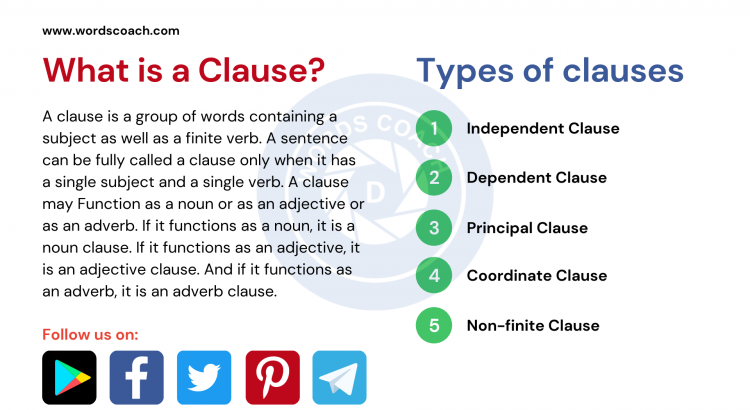What is a Clause?
Definition of Clause
A clause is a group of words containing a subject as well as a finite verb. A sentence can be fully called a clause only when it has a single subject and a single verb. A clause may Function as a noun or as an adjective or as an adverb. If it functions as a noun, it is a noun clause. If it functions as an adjective, it is an adjective clause. And if it functions as an adverb, it is an adverb clause.
Example:
- When I came here, I saw her. (Two clause sentence)
- I completed my graduation last year. (One clause sentence)
- I like Mathematics, but my sister likes Biology, Because she wants to become a doctor. (three clauses sentence)
Types of clauses
- Independent Clause
- Dependent Clause
- Principal Clause
- Coordinate Clause
- Non-finite Clause
1. Independent Clause
An Independent Clause is a clause that is a meaningful sentence itself. An independent clause contains a subject and a finite verb makes a complete sentence by itself.
In a sentence two independent clauses can be connected by the coordinator’s conjunction: and, but, or, nor, so, for, yet.
Example:
- I read the Novel. (One independent clause)
- Let’s go to the shop. (One independent clause)
- I want to buy a Laptop, but I don’t have enough money. (Two independent clauses)
2. Dependent Clause
A Dependent clause must require an object to be completely meaningful. It is also called a subordinate clause or embedded clause. These help the independent clauses complete the sentence. independently, it cannot form a complete sentence.
Example:
- I know that she cannot do it.
- If you don’t eat, I won’t go.
- He takes medicine because he suffers from fever.
- The teacher asked a question but no one answered.
Dependent clauses are divided into three types:
A. Noun Clause
A noun clause is a group of words that contains a subject and a verb of its own and does the function of a noun.
A Dependent Clauses acting as Nouns in sentences are called Noun Clauses or Nominal Clauses. A noun clause starts with that, how other WH-words (Which, What, Who, When, Where, Why, Whose and Whom), if, whether etc.
Examples:
- I hope that I will get a job.
- You need to express that it’s crossing a line for you.
- Please tell me who left his shoes on the floor.
B. Adjective Clause
An adjective clause is a group of words that contains a subject and a verb and does the work of an adjective.
These are also called Relative Clauses and they usually sit right after the Nouns they modify.
Examples:
- The house I own is very beautiful.
- Ali has a car which is very beautiful.
- I’m looking for the red book that went missing last week.
- I was wearing the dress that I bought to wear to Jo’s party.
C. Adverb Clause
An adverb clause is a group of words that contains a subject and a verb and does the work of an adverb.
Examples:
- The path was so rough that I could not walk on it.
- Rina ran to the point of panting vehemently.
- She cried because her seashell was broken.
3. Principal Clause
A Principal Clause is an independent clause that can exist even without a subordinate clause.
Independent and Principal Clauses are functionally the same but named from different perspectives.
Examples:
- She is the best girl in the class.
- I know that girl.
- Robin fishes like a pro.
- He wrote a letter.
4. Coordinate Clause
A Coordinate Clause is two or more independent clauses in a sentence that are of equal importance and usually joined by Coordinating Conjunctions (and, but, or, for, yet, nor, so, etc).
Examples:
- I am a vegetarian, so I don’t eat any meat.
- Thomas will be late to work, for he has a dental appointment.
- She is poor but she is honest.
5. Non-finite Clause
A non-finite clause is a type of subordinate clause that is based around on a principal clause and An infinitive verb. In terms of a Participle, the Participial Phrase takes place of the Subject or Object of the sentence.
Examples:
- The person to ask about going to Canada is Beck.
- She is the first person to enter the office.
- He was very lucky to be the only one to win a prize.
Related Post
A comprehensive list of two-letter words

